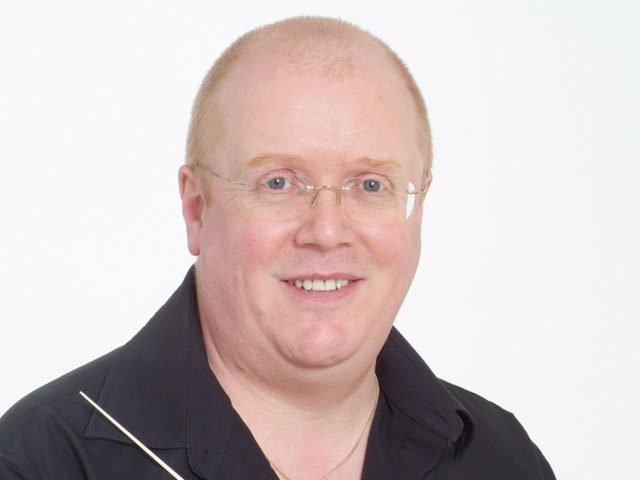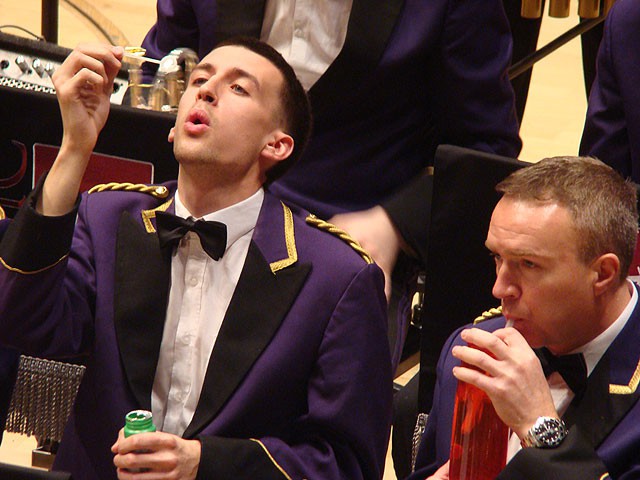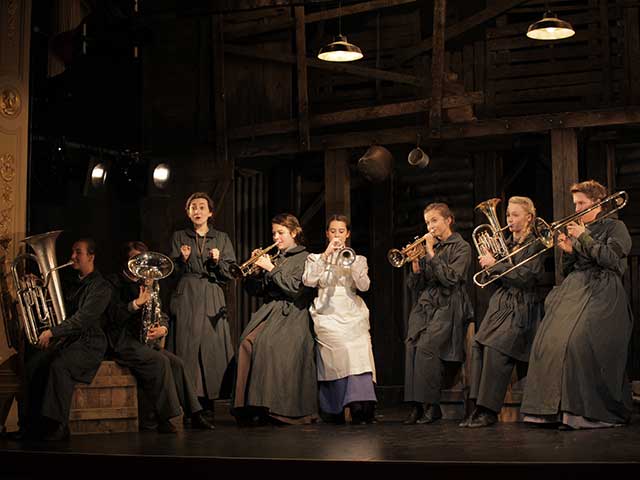
A man with a point to make: Sandy Smith
There is little doubt the recent ‘Prescription Pad Junkies’ article by 4BR Editor Iwan Fox has created something of a stir.
Conversations I’ve enjoyed with colleagues and friends since its publication have focussed on the issues raised - and resonated with thoughts I have had on the subject for many years.
Mature debate
Time then to put my head above the parapet in the hope that others (who agree or disagree) can be persuaded to engage in a mature debate about a topic that I believe has far reaching effects for the future of the brass band movement.
The prescription pad/drug analogy - although deliberately intended to make the reader sit up and take notice - is a good one.
We are often told that our over-reliance on antibiotics will ultimately render them ineffective - in much the same way as the repeated use of what I call the ‘Test Piece Check List’ school of composition (TPCL), is making far too many major brass band compositions musically sterile.
Two main problems
In my opinion there are two main problems with this fixation towards technique driven repertoire: Our damaging reliance on contesting and the lack of musical leadership.
There is little doubt that our continued ‘addiction’ to competition has forced banding into a musical cul-de-sac of its own compositional making.
As a result, we have seen the almost complete demise of brass bands participating in major music festivals - events that enjoyed regular representation through the 70s, 80s and into the 1990s.
Homogeneous
Instead of being able to showcase new works of stature from a variety of compositional voices, we now only provide a shop window to leading festival promoters featuring a depressingly homogeneous list of repertoire inspired by TPCL composition.
Many pieces of genuine musical worth continue to be sidelined in favour of the superficial; the over-hyped circus trick concoctions, full of solo and cadenza passages which are akin to watching the tightrope balancing dog on the X Factor.

What next to thrill us all?
Incredulity
They are works that gain an initial reaction of incredulity - one however, that is soon replaced by the realisation that these technical stunts contain the same depth of musical relevance: Bands are fast becoming experts in playing higher, faster and louder - and nothing much else.
We are repeatedly told, not least by the people involved in the performances, that these compositions highlight the skills of our many ‘world class’ bands: Yet for all the hyperbole, major brass band compositional output has a miniscule profile in the wider media.
That good?
If it really is that good, why is the BBC not falling over itself to showcase all of this on Radio 3 on a regular basis?
I fear that our collective desire to concentrate on a narrow definition of what constitutes ‘technique’ will continue unabated - leading us ultimately to run headlong into a self-imposed world of musical irrelevance.

Is the TPCL school of composition really ticking the right boxes?
Lost our way
Perhaps we have all lost our way (players, conductors, contest organisers alike) because we cannot see further than the next prescription pad induced ‘contest day’ fix.
The National Championships of Great Britain has commissioned very little new music for the top section in recent years - instead relying on ‘bespoke’ contest works written for individual bands. The British Open has seemingly turned back time to the era of ‘Recollections’ and ‘Gems’.
These works have ticked all the known formulaic TPCL boxes - often losing all sense of individual compositional integrity as the composers are asked to abandon their true individual voices in the process.
You only need to listen to the works of such composers who also write for the wider classical music world to discover this.
Resurgam
Bands may well enjoy displaying their technical prowess, but too often it comes at the expense of a cohesive well wrought musical structure: You don’t always need more notes to ‘sort out the bands’ - just ask them to try playing the opening bars of ‘Resurgam’.
In the modern day contest arena, non TPCL repertoire is now deemed ‘unfashionable’ to contemplate for those who would rather keep the focus on ‘technique’ rather than on musicality based on nuance, subtlety, astuteness and acumen.
However, it is also invariably technique that is brash, repetitive, guileless and heavy handed. As 4BR once said in a variation on a line from the film ‘Cool Hand Luke’: It leaves the same deep impression on the mind as being hit across the head with a shovel.
It has also led to a form of contest repertoire ignorance.
Paganini
To take the 4BR Editor’s choice of Wilby’s masterpiece ‘Paganini Variations’ as an example:
Why would it be so misguided if it were to be chosen as the set-test piece for the National Championship?
One can imagine some conductors/players/listeners/pundits crying “it’s not hard enough” or “it’s no longer a sufficient challenge for elite bands”.
In reality that is banding speak for “We are fearful” - fearful of having to impress the judges with anything other than the bludgeon of our technical brilliance.
The sterility of that thinking process is that you don’t win contests by musicality anymore - but by not making mistakes. Master technique and you can’t lose.

Others do musical theatre so much better...
Musical theatre
Which brings me to the current trend of bringing to the contest stage what is puzzlingly referred to as some form of ‘musical theatre’.
If it adds so much to the musical experience why don’t we see bassoon players meandering down stage front for the opening of ‘The Rite of Spring’ or clarinet soloists going walkabout during the long solo in the slow movement of the ‘Second Symphony’ by Rachmaninov?
If you want musical theatre go and see something by Stephen Sondheim. It’s done so much better.
Ignorant
The trouble is that you can only be impressed by the TPCL school of composition if you are ignorant of the history and development of western classical music in all its genres: That you have closed your ears to the variety of ways it is currently being developed outside the brass band medium.
We are also where we are because we have lost the inspirational leaders who drove repertoire development forward by commissioning composers with genuine individual voices to write for the medium - challenging our ingrained conservatism to change in the process.
New leadership and new voices
Where are the new Brands, Howarths and Snells, who could lead us to the new generation of Pickards, Lloyds and McCabes?
Why aren’t we exploring the sound worlds of Gavin Higgins or Paul McGhee or allowing our more established voices such as Peter Graham or Stephen Roberts to free themselves of imposed formulaic constriction?
Until those in a position of commissioning power aspire towards music that will have a legacy that can resonate far from the contesting stage, we will continue to become ever more alienated and removed from audiences that appreciate music of greater depth, structure, intellect, subtlety and argument.

The new compositional generation: McGhee, Dobson, Higgins and Pankhurst
No one listening
There will simply come a time when no one will want to listen to us except ourselves - and a quick glance around most contest day venues suggests that even that is becoming a rarity.
When the dust finally settles on the last two decades of banding history we will see a movement bedevilled by the shallowness of its musical aspirations.
Hard to berate
There are, of course, a few exceptions to this, and it is hard to berate the conductors and bands who are commissioning these TPCL works.
They are after all only trying to win a contest: They pay the piper, they call the pastiche tune - complete, as the 4BR says, with ‘grandiose hyperbolic title…. outlandish percussion requirements, eye-catching choreography... and never ending quasi-cadenzas/solo spotlights’.
There is a great deal of fantastic music in all styles and genres - not just brass - available to us in a multitude of ways. Listening time is too precious to tolerate the false and the mediocre.
The legacy we leave for future generations isn’t contest results or even the recording of a winning performance as much as it is the quality of the music we have championed to perform in the first place.
It is by this that we will ultimately be judged.
Sandy Smith
The Author:
Sandy Smith has gained a worldwide musical reputation as a performer, arranger, composer and teacher.
He was the renowned tenor horn player with the likes of Black Dyke, Fairey and Grimethorpe, whilst his compositions and arrangements for brass bands have won numerous awards
He has lectured on brass band scoring, arranging and the history and repertoire of the brass band at Huddersfield University and was Professor of tenor horn at the Royal Northern College of Music in Manchester for many years.













